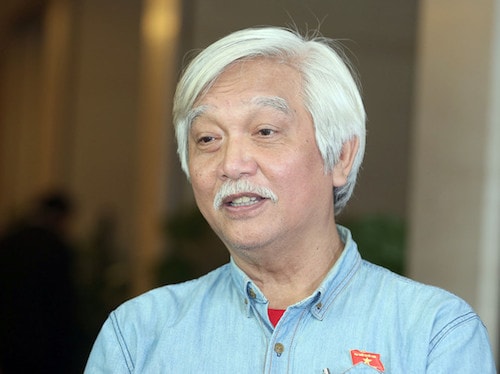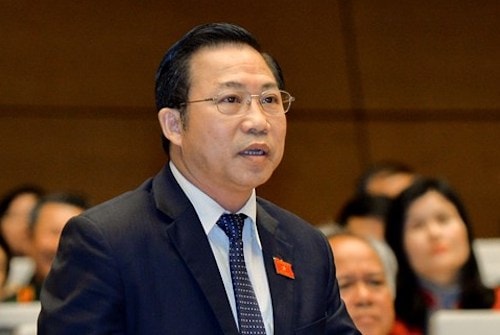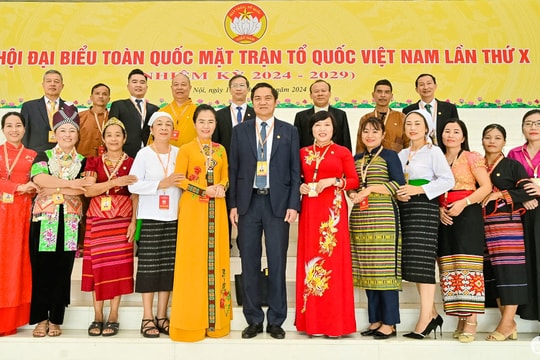How will National Assembly deputies vote for confidence in 48 positions?
To consider the credibility of leadership positions, in addition to the submitted documents, many delegates said it would "mainly rely on voters' opinions".
During the working days from October 24 to 25, delegates will take a vote of confidence for 48 positions elected or approved by the National Assembly, including: Prime Minister, National Assembly Chairman, Vice President, Government members, Standing Committee members...
Voting is conducted by secret ballot. The ballot clearly states the full name and position of each person with three levels: high confidence, confidence, and low confidence.
"The vote of confidence aims to improve the effectiveness and efficiency of the National Assembly's supervisory activities as well as the quality of the state apparatus," said Mr. Tran Van Tuy - Head of the Delegation Affairs Committee.
In addition, according to Mr. Tuy, the above activity also helps those who are voted to see their level of trust to strive, practice and serve as a basis for competent organizations to consider and evaluate cadres.
|
Delegate Duong Trung Quoc. Photo:PV. |
Historian Duong Trung Quoc said that compared to the two previous votes of confidence (2013 and 2014), this time there was a positive improvement in that delegates received the files of the positions early to have time to study them.
The work report of the person subject to the vote of confidence must be calculated from the time of election or approval by the National Assembly (July 2016), stating the results of implementation of assigned tasks and powers; political qualities, ethics, lifestyle; compliance with the Constitution and laws; 4-5 pages in length, typed and printed on A4 paper.
Along with that, the report also self-assesses and reviews whether or not there are signs of degradation in political ideology, lifestyle ethics, "self-evolution", "self-transformation" within the organization according to Resolution 4 of the 12th Central Committee; self-assesses and reviews the implementation of the organization's restructuring and staff streamlining in the organization, agency, and unit...
Although the content of each position's profile is quite complete in all aspects of work, Mr. Quoc is concerned because "these are only one-sided self-assessment reports"; moreover, these documents are considered confidential, so delegates cannot get people's opinions on those self-assessments.
"This is an important monitoring activity that the people are interested in. I will give a truly objective vote in accordance with the responsibility of an elected representative," Mr. Quoc said, suggesting that in the coming time, the National Assembly should study and amend regulations in the direction of allowing public disclosure of work reports of each position as well as the specific votes given by each representative.
"The previous two times we only knew how each position was voted for, but we did not know how each delegate expressed their attitude. I think this should be made public," Mr. Quoc emphasized.
Sharing the same opinion with Mr. Quoc, delegate Pham Thi Minh Hien said "voters are very interested in taking a vote of confidence and consider it necessary."
According to her, in addition to documents, an important information channel that helps delegates make objective and accurate assessments is listening to the people, especially the group of voters directly related to the field and industry that the position being voted for is in charge of. "I consider this the leading information channel," said Ms. Hien.
|
Delegate Pham Thi Minh Hien. Photo:PV |
When asked how she personally evaluates each position that is voted on based on criteria, delegate Hien said she will consider the entire process, for example, a minister when he first takes office, what difficult and favorable circumstances he faces, and what policies he has proposed to resolve the issues and develop the field he is in charge of.
“I have a habit of taking full notes of each questioning session of Government members. Before taking the vote of confidence, I will systematize those notes to have a more objective view and assessment,” she said.
The female delegate also expressed her opinion that the vote of confidence will directly affect the political life of the position being voted for, "but the national life is the most important, if it is necessary to evaluate a specific position as having low confidence, the general interest must be put first."
“In some areas, at the beginning of my term, I had some quite heated questions and debates, but over time, the Minister and that sector have made changes, so those efforts need to be recognized. On the contrary, in areas where changes are slow, we will have to consider them frankly,” Ms. Hien said.
In addition, with hot, difficult issues that cannot be solved "in a day or two" of ministries and branches, Ms. Hien said, "it is necessary to first evaluate the attitude and viewpoint of the leader".
Concerns about three levels of credit
Delegate Luu Binh Nhuong - Deputy Head of the People's Aspirations Committee said that taking a vote of confidence is an important activity, of special value to control the power of positions elected or approved by the National Assembly.
However, Mr. Nhuong still worries: "Each 5-year term only has one mid-term vote, which will not fully and accurately assess the capacity of the positions. In the long term, I recommend that the competent authority consider allowing the assessment of cadres to be conducted regularly every year."
|
Deputy Head of the People's Aspirations Committee Luu Binh Nhuong. Photo:QH. |
The three levels of evaluation when taking a vote are also something that makes Mr. Luu Binh Nhuong worried. “We only have three levels of high confidence, trust, and low confidence. So what about those who are not trusted? For a long time, there have been suggestions that we should only take a vote of confidence with two levels: trust and no confidence. Many countries in the world also only have those two levels of evaluation,” Mr. Nhuong said.
Mr. Duong Trung Quoc also said, "We take a vote of confidence differently from many countries, which is to give three levels, whether high or low, it is still confidence. I hope that in the coming years this will be improved to be in line with international practice."
According to regulations, if more than half of the total number of delegates rate a person as having "low confidence" on their vote of confidence, they can resign.
In case the person subject to the vote of confidence is rated as "low confidence" by two-thirds or more of the total number of delegates, the Standing Committee shall submit to the competent authority to initiate the vote of confidence process.
Voting is explained differently from voting in that voting with three levels is to "assess the level of confidence", and once the voting process has been initiated, the National Assembly will express confidence or not (two levels) in the person being voted on as a basis for dismissal or approval of the proposal for dismissal.










